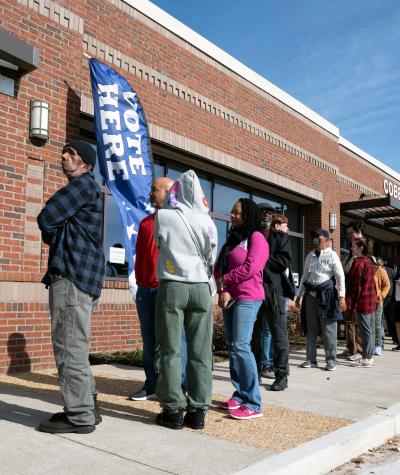Our democracy is strongest when every American has the opportunity to participate. Yet coordinated efforts by partisan actors to conduct “mass voter challenges” threaten Americans’ freedom to vote across the country and stand to overwhelm and overburden election officials during an already busy time.
Mass challenges are exactly what they sound like — attempts by individuals to question or challenge someone’s eligibility to vote. Currently, 46 states have laws on the books that allow individuals to challenge a registered voter’s qualifications under certain circumstances.
Voter challenge laws have long been used in this country to target recently naturalized citizens, voters of color, student voters, and voters with disabilities. Many states first enacted their voter challenge laws following Reconstruction to block newly enfranchised Black voters from accessing the polls.
Bad actors have used some states’ relatively lenient challenge laws to challenge the eligibility of hundreds, and even sometimes thousands, of voters at once. These mass challenges are often generated using stale, outdated information or unreliable methods to identify supposedly ineligible voters — who have already verified their eligibility under penalty of perjury when they registered to vote.
Not only do these mass challenges threaten to suppress the votes of eligible Americans, but they also intimidate voters from exercising their freedom to vote and overwhelm election officials.
As the Department of Justice recently explained, federal law protects voters from having their registration cancelled on the basis of frivolous mass challenges made without sufficient evidence.
Many states also place restrictions on the types of challenges that can be made and specify what evidence is required.
Election workers can do their part to protect the rights of voters in their jurisdictions by providing voters with a fair process before canceling their registration or rejecting their ballots, including notice of any challenges made and a meaningful opportunity for the voter to address the challenge.
Election officials should also swiftly reject mass challenges that are based on impermissible grounds or lack reliable evidence.
Campaign Legal Center has been working to protect voters from unfair challenges to their freedom to vote. Ahead of the 2024 election, CLC shared guidance with 11 states across the country by notifying state and local officials of their duties to protect against mass challenges that could remove voters from the rolls.
Read the letters to Arizona, Florida, Georgia, Michigan, Nevada, North Carolina, Ohio, Pennsylvania, Texas, Virginia and Wisconsin.
As we head into an incredibly busy and contentious election, states should empower election officials to quickly dismiss any challenges that are not supported by evidence, so voters and election officials are able to respond to legitimate challenges and carry out their other important election responsibilities.
Finally, all voters should have a fair opportunity to respond to challenges on or before Election Day, so they can make their voice heard.
Our democracy works best when all voters can participate. Mass challenges only serve to counteract this ideal. States can and should take action to ensure that mass challenges don’t threaten Americans’ freedom to vote.


